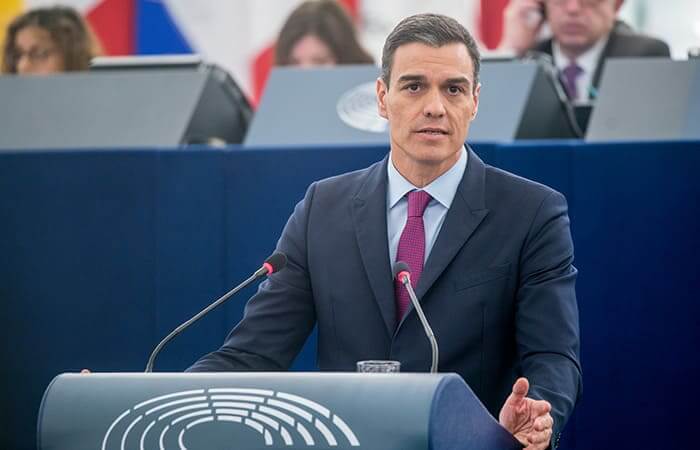What the polls say
The final countdown to the Spanish General Election has begun and now it is only two days away. Referred to as “28-A” by some news outlets – signifying 28th April, the date of the vote – the Spanish General Election is intriguingly poised, according to the latest polls.
Why is there an election?
Sunday’s snap election was called in February by Pedro Sánchez, the current Prime Minister, who assumed the role last June following a no-confidence motion against the former leader, Mariano Rajoy.
The reason for calling the General Election after just a 10-month term was partly due to a failure to get PSOE’s (the Socialist Party’s) proposed state budget through the Congress of Deputies on 13th February, owing to opposition from right wing and Catalan separatist parties.
Another reason was PSOE’s weak showing at the last regional elections in Andalucía. The centre-left Socialist Party has traditionally held a majority of seats in regional government in the southernmost Autonomous Community, but they achieved 14 fewer seats at last December’s elections than at the 2015 polls.
This disruption of the “natural order of things” in southern Spain (PSOE has dominated Andalucian politics for the last 36 years), can be attributed to the rise of a new force in Spanish politics, VOX, who secured a landmark 12 seats seemingly out of nowhere.

Two ends of the spectrum
VOX, the far-right party created as recently as 2014, has experienced a spike in popularity – opinion poll averages give them a 10.7% share of the votes at the moment1 – due to its hard line stance on issues such as Catalan independence, immigration, support for bullfighting and what it sees as a persecution of men in an overly-feminist contemporary society.
In contrast, the far-left coalition Unidas Podemos, fronted by ponytail-wearing Pablo Iglesias, has waned in popularity since reaching a peak of more than 20% of the national vote in 2016/17.
It was at this time that they vowed to combat austerity and bring credibility back to a political infrastructure that was suffering fresh public corruption, fraud and white-collar crime scandals under Mariano Rajoy’s People’s Party (PP) government.
Although both parties have clear (and, for the most part, entirely polarised) policies on social, financial and environmental matters, for instance, they would need to form alliances with better-polling parties to have a chance of being on the winning team come election day.

What are the main issues?
According to data from Spain’s Sociological Research Centre (CIS)2 collected in March, the five biggest problems facing the country, as identified by a sample of over 16,000 individuals, are:
- Unemployment (61.8% of respondents cited this problem)
- Corruption and fraud (33.3% of respondents cited this problem)
- The state of Spanish politics, political parties and the politicians themselves (29.1% of respondents cited this problem)
- State of the Spanish economy (25% of respondents cited this problem)
- Healthcare (16.6% of respondents cited this problem)
The next issues on the list were employment conditions (11.1%), Catalan independence (11%) and social problems (10.1%).
Although this data is just a snapshot of what’s important ahead of the Spanish General Election, it’s interesting to know what key concerns are shared by the voting populous.
So, who will win the Spanish General Election?
In this day and age, the traditional two-party political system no longer applies in much of Europe, so “winning” an election isn’t so cut and dry.
Alliances must be carved out where votes are distributed across multiple parties, since the chances of one single party achieving a majority are very slim.
In the case of this weekend’s Spanish General Election, the front-runners are current PM Pedro Sánchez’s PSOE and the centre-right PP, with an expected 29.2% and 20.1% of the votes respectively.
Since neither have a majority, according to the polls, several outcomes are still on the table. A right-wing confederate featuring PP, Ciudadanos (the third most popular party with 15.5%) and VOX could out-trump a potential confidence-and-supply agreement between PSOE, Unidas Podemos and the Basque Nationalist Party, but it’s impossible to say until the votes are counted.

Yet to decide
What is clear, however, is that there are still a lot of undecided voters out there. Some estimates believe this sector of the voting population to be between 25% and 30%, while others put this number at nearly 40%3.
Of this total of temporary fence-sitters, women are believed to make up around 60%4. Policies regarding women’s rights, abortion, surrogacy, sexual consent and the gender pay gap are, therefore, a high priority on each party’s manifesto; so securing the female vote will be a key factor in the outcome of the Spanish General Election.
What do you see as the greatest obstacles in Spanish politics? And how do you see the elections playing out? I’d love to hear your thoughts in the comments below!
Sources:
1 https://www.theguardian.com/world/2019/apr/23/spains-general-election-2019-all-you-need-to-know
2 http://www.cis.es/cis/opencms/ES/9_Prensa/Noticias/2019/prensa0418.html
3 https://www.euronews.com/2019/04/12/spanish-general-election-2019-who-are-the-candidates-and-what-are-their-manifestos
4 https://www.euronews.com/2019/04/24/spanish-general-election-result-could-hinge-on-female-voters
Photo of Congreso de los Diputados, Madrid by Roy Luck Attribution 2.0 Generic (CC BY 2.0) www.flickr.com/photos/royluck/6394605495
Photo of President of the Spanish Government Pedro Sánchez by European Parliament CC-BY-4.0: © European Union 2019 – Source: EP
 en
en




 Vlaams-Nederlands
Vlaams-Nederlands
0 Comments
Leave a Comment
DISCLAIMER
The opinions and comments expressed by contributors to this Blog are theirs alone and do not necessarily reflect the views of VIVA Homes Under the Sun Ltd, any of its associated companies, or employees; nor is VIVA to be held responsible or accountable for the accuracy of any of the information supplied.
Have you got something to say?